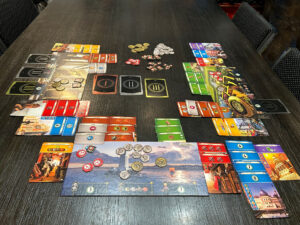
In 7 Wonders, each player represents a great, ancient city that is the home of one of the Seven Wonders of the Ancient World. When we played the game at Compulsory Merriment, I played Babylon; Chris played Alexandria; and Mandi played Olympia. Each player gets a player board that represents their city plus a hand of cards, a handful of coins–and it’s on!

The game is played in three Ages–otherwise known as rounds. The cards for each Age are helpfully numbered 1-2-3, in Roman numerals, of course, to keep to the ancient vibe. On each turn, you’ll choose a card and pass the rest of your hand to the player beside you. This turns out to be a great mechanic because you’re never permanently stuck with the luck of the draw, plus you can spy a little bit and gather information on each pass.
There are 7 types of cards (naturally!) and they’re played in different ways. Most of the time, you’ll choose a card and play it right away, starting with the two types of resources: natural and manufactured. You have to build up resources to play the other cards but once you have, say, wood or papyrus, you have it permanently. You can build up a big bank of resources to use for bigger and bigger plays plus you can rent the use of your resources to the players/cities beside you to earn more coins.
Once the conditions on your player/city board are met–and this usually requires resources–you can play a face down card to build out your Wonder. This action accomplishes two things: you get more stuff at each of the three stages of building out your Wonder, plus the card you play there is taken out of the game so nobody else can use it.
There are Structure cards that give you victory points or tricky advantages. Science cards encourage you to collect the whole set! You get points for collecting lots of one kind of Science and even more points for collecting all three of the Sciences. In Age III, there are Guild cards that let you gain victory points, mostly from the cards your neighbor cities have played. And there are Military cards that allow you to build up an army–which is where we lured Mandi into a (very) rare loss.
Each Military card gives you 1-3 points of strength. At the end of each Age, all the cities have a battle. The player with the most Military strength gains a point from each city they beat; and the losing city loses a point. Mandi went full gangster the first time we played, building up a huge army, using Military cards to build out her Wonder so nobody else could have an army. Meanwhile, Chris gathered resources and coins–mostly from me because I was hanging out in my little zen garden of Babylon, building structures and sciences and buying resources from Chris.
And I won! I won! (she says with a maniacal cackle.) Then Chris beat Mandi at the next game and we all went out to stock up on canned food and bottled water in preparation for whatever kind of apocalypse is coming when Mandi loses to both of us.
I didn’t handle it well, of course. I kept making stern remarks to Mandi about how, “crime doesn’t pay.” Then we played again with Kasper and Mandi–having figured out the strategy of collecting all the Commercial Structure cards that take points from all your neighbors–well… Mandi stomped us all. Turns out, what you might call “white collar crime” does pay.
7 Wonders looks like a big, complicated game that takes forever to set up, learn and play but it’s not! The setup is easy, the rules are simple, and each game only takes about 30 minutes. The trick is finding the right winning strategy. (Hint: it’s not building up a big Army.)
30 minutes playtime, 2-7 players, Ages 10+